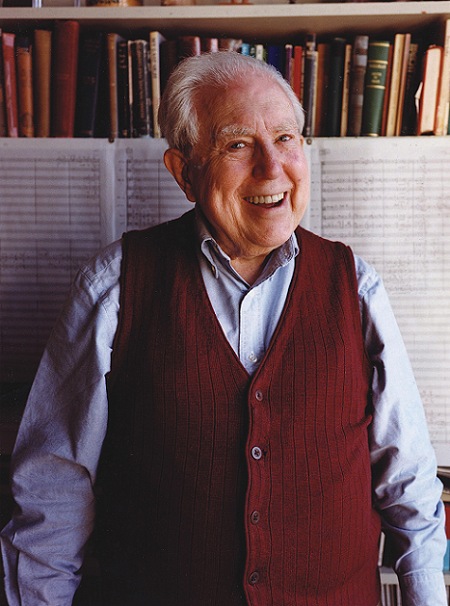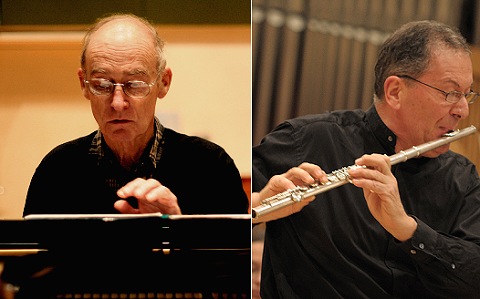
The S.E.M. Ensemble will open its 40th anniversary season with its annual Christmas concert at Paula Cooper Gallery in New York City on Tuesday, December 15. SEM has performed a holiday concert at the gallery for the last 25 years, and this year’s program will feature two N.Y. premieres by new-music icon Christian Wolff (above left), the first public performance of Petr Kotik‘s (above right) new percussion work performed by TimeTable Percussion, and Lejaren Hiller‘s rarely heard String Quartet no. 5, along with a work by J.S. Bach.
Christian Wolff is also marking his 75th birthday this year, and has put together a kind of celebratory all-Wolff concert at Roulette on Dec 12th. Christian was kind enough to write a bit about his music on both of these concerts:
On December 15, the S.E.M. Ensemble will perform two New York premieres of my work: “Flutist (with percussionists)” and “For John”, as part of their annual concert at Paula Cooper Gallery (NYC). This will be one more in a long line of performances of my music by Petr Kotik and the S.E.M. Ensemble, beginning, I think, in the early 1970s, not long after Petr came to Buffalo – he had already organized the first performance of an early piece of mine in Prague in the 60s. There has been an extraordinary continuity of support. And, with this encouragement, I’ve also written pieces for the ensemble, as well as for the orchestra associated with it (the S.E.M. Orchestra in New York).
“Flutist (with percussionists)” came about when Chris Nappi, longtime percussionist for the SEM ensemble and friend, asked me for a piece – in exchange for music copying he had done for me. He wanted something to play with another percussionist, so the music is for more than one player. Then Petr Kotik, composer, conductor and excellent flutist, had me at his Ostrava (Czech Republic) New Music Days in 2003. I can’t exactly remember, but I think he was looking for some additional music for one of the concerts, so I made solo flute music for him, and then, since Chris was also there, it occurred to me the two pieces could be done simultaneously. Each piece has pauses of free duration, determined in the process of playing by the performers, so that they can be free to space their material in relation to one another, improvisationally. In addition, the flute material consists of a collection of shorter units which can be played in any sequence, as the player decides, and sometimes repeated, so that’s another element in ‘improvising’ the relation of the two pieces.
“For John” was written as part of a collaborative piece titled “For John” in celebration of John Cage at Bard College a few years ago (when the John Cage Archive was relocated at Bard). My contribution was a small set of piano nocturnes and “Material”, music playable by any smaller collection of performers (instrumentation not specified). The others collaborating were David Behrman, John King and Takehisa Kosugi, who played their own work simultaneously with mine, and intermittently we all played from the “Material”.
Then on Saturday, December 12, at 8:30 pm there will be a concert of my music at Roulette. The main item on the program will be the premiere of a new piece “Quintet”, written especially for this occasion.
After an earlier New York concert of my music, which was ok, but not quite ideal, I thought why not try to collect some of my favorite musicians who might be available in the New York area. 2009 is also the year of my 75th birthday, so this might also be a kind of celebration. The musicians are Larry Polansky, composer, long-time friend and colleague in Hanover, New Hampshire (but we both grew up in New York), and fine guitar player; Robyn Schulkowsky, also a longtime friend with whom I’ve done a lot of music, regarded in Europe as the premiere percussionist for new music, but also long associated with people like John Cage and Morton Feldman, and a great improviser; Robert Black, double-bass, also someone with whom I’ve worked over a long time, probably best known as an anchor of the Bang on a Can All-Stars. We also have all been involved in recordings of my music (Robert a CD of all my music involving double-bass, Robyn a solo percussion CD and she and Larry more recently on a recording of 10 “Exercises”). The other player, along with myself (on piano and melodica) will be Joey Baron, drummer, associated for years with John Zorn, but even better known as jazz drummer in his own right. Joey had been hearing my music in the last years and said he liked it, so it occurred to me to ask him to join us, and he agreed – a challenge for both us, me writing for a ‘non-classical/new music’ performer, him playing such music. The element of improvisation, or structural flexibility in my music I hope will provide a bridge.
The rest of the program will consist of earlier pieces, a double-bass solo “Look She Said”, a solo snare drum “Peace March”, and an electric guitar piece “Another Possibility,” written to make up for my losing (it was stolen) the only existing copy of a piece by Morton Feldman, “The possibility of a piece for electric guitar.”
Thanks Christian, Happy (late) Birthday, and have a great show or two! More information for the S.E.M. concert can be had here; for the the Roulette gig click here.
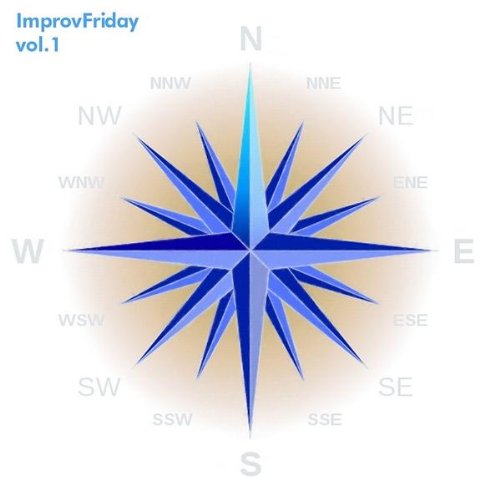
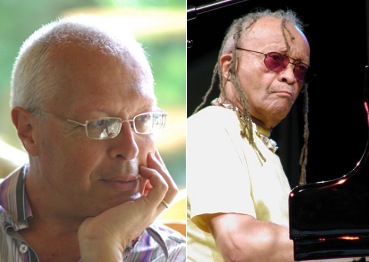
 Full of food and drink, playing with those presents, a couple days now to relax… How about capping the holiday huddled around the warm, cozy glow of the old ‘puter?
Full of food and drink, playing with those presents, a couple days now to relax… How about capping the holiday huddled around the warm, cozy glow of the old ‘puter?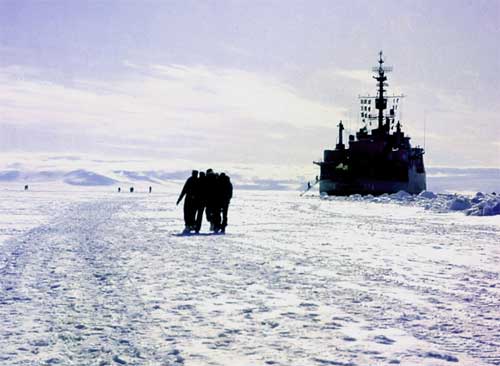 I took this picture at McMurdo Sound, Antarctica around 3 a.m. on December 25, 1966 as some of my shipmates and I made our way back from the McMurdo “Playboy Club” to the U.S.S. Atka, a Navy icebreaker that no longer exists. Given the other military options available to young men on that date, it was not a bad place to be. This rather surreal tableaux of drunken comraderie illustrates, I think, a dirty little secret known to all men and a few women and that is that men–especially hetrosexual men who have worked, lived and played together under difficult circumstances–love each other best.
I took this picture at McMurdo Sound, Antarctica around 3 a.m. on December 25, 1966 as some of my shipmates and I made our way back from the McMurdo “Playboy Club” to the U.S.S. Atka, a Navy icebreaker that no longer exists. Given the other military options available to young men on that date, it was not a bad place to be. This rather surreal tableaux of drunken comraderie illustrates, I think, a dirty little secret known to all men and a few women and that is that men–especially hetrosexual men who have worked, lived and played together under difficult circumstances–love each other best.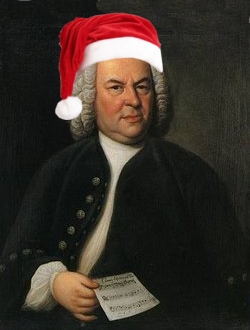
 WNYC’s acquisition of New York radio’s stalwart WQXR was a win/lose proposition. Win, in that a major classical station would stay alive; lose in that the new assigned frequency (which can conflict with a powerful Connecticut station on the same frequency) and reduction in broadcast power (from 6,000 watts to only 600 watts) reduces its reach by some millions of potential listeners. Not that it matters much to me, parked on my hiney here in Houston; I and so many others simply go
WNYC’s acquisition of New York radio’s stalwart WQXR was a win/lose proposition. Win, in that a major classical station would stay alive; lose in that the new assigned frequency (which can conflict with a powerful Connecticut station on the same frequency) and reduction in broadcast power (from 6,000 watts to only 600 watts) reduces its reach by some millions of potential listeners. Not that it matters much to me, parked on my hiney here in Houston; I and so many others simply go  Musical America
Musical America 